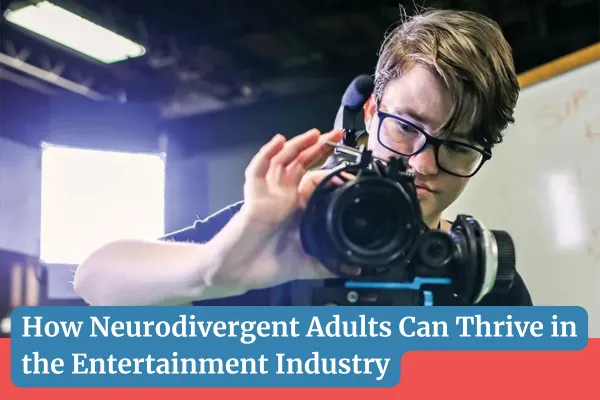
How Neurodivergent Adults Can Thrive in the Entertainment Industry
When it comes to neurodivergent adults, particularly those on the autism spectrum, pursuing a career in the entertainment industry may seem like a dream that’s out of reach.
But guess what?
It’s totally possible—with the right support, resources, and mindset.
Below are some ideas on how parents can guide their kids toward this creative path and how neurodivergent individuals can unlock opportunities in the entertainment world.
1. Parental Support is Key to finding success in the entertainment industry
If you’re a parent raising a child with big dreams of working in entertainment, your support can make all the difference. Instead of steering them toward traditional careers, be their biggest cheerleader.
Encourage them to pursue their passions, even if they seem unconventional. Believing in your child’s abilities and helping them access the right tools and resources can open doors you never thought possible.
Dani Bowman, an autistic animator featured on Love on the Spectrum, is a prime example. She started her animation company, Danimation Entertainment, at just 14 years old! Her success didn’t happen overnight, but with the help of her aunt and uncle, she was able to make her dream a reality.
Parents, don’t underestimate the power of your support—it’s jet fuel for your kid’s aspirations!
2. Education and Skill-Building
Talent is great, but learning the craft is critical. Whether it’s animation, video editing, or directing, there are plenty of educational resources available. From traditional four-year degrees to YouTube tutorials, there’s no shortage of ways to build the skills needed for a career in entertainment.
Dani Bowman’s company is not just a personal success; it’s also an educational hub. Danimation provides remote training for both kids and adults on the autism spectrum, helping them develop the technical skills needed to break into the industry. Programs like this offer invaluable opportunities for neurodivergent individuals to learn and grow.
Find out what your child is interested in and be creative about how they can build that skill set.
3. Networking and Community is Everything
The entertainment industry runs on connections. Networking might feel intimidating, but it’s one of the best ways to open doors. Encourage your child to join online support groups, attend industry events, and connect with like-minded individuals. The Orange County Asperger’s Support Group (OCASG) and similar organizations offer a platform for people to share advice, ask questions, and network with others on a similar journey.
A great example of this in action is Dani Bowman’s work on the documentary Schlitzie: One of Us, where her team of animators bring historical moments to life. The documentary director’s daughter, who is also on the spectrum, was the editor, showcasing how people within the community lift each other up and collaborate on exciting projects.
4. Take Advantage of Government Resources
Let’s talk about money. Breaking into the entertainment industry often requires internships or entry-level positions that might not pay much (or at all). But did you know there are government programs designed to help neurodivergent individuals gain work experience?
In California, for example, the Paid Internship Program actually covers the salary of neurodivergent individuals, allowing them to build their resumes without worrying about finances.
Parents, it’s worth doing some research into what resources are available in your area. It may take some legwork, but the payoff can be life-changing for your child’s career prospects.
5. Autism-Friendly Companies
Neurodivergent individuals don’t have to go it alone—there are companies out there specifically looking to hire them. Organizations like Brainstorm Productions and Danimation are committed to hiring individuals on the spectrum, offering them the chance to gain experience and showcase their skills.
Brainstorm’s Center for Learning Unlimited offers a three-year certificate program free of charge (with some eligibility requirements) to help neurodivergent adults develop the skills needed for a career in animation, film, and media. Programs like these are a gateway to real, fulfilling work in the entertainment industry.
6. The Path is Flexible
The beauty of the entertainment industry is that there isn’t a one-size-fits-all path. Some neurodivergent adults may go through specialized training programs, while others may be completely self-taught. YouTube, for instance, offers a world of tutorials on everything from animation to video editing, making it easier than ever to learn at your own pace.
There are also traditional routes, like earning a degree in television and film, that can help open doors.
The key is finding what works best for the individual and staying open to different learning methods and opportunities.
If your child dreams of making it in entertainment, the good news is that it’s entirely possible. By supporting their ambitions, exploring educational options, building networks, and taking advantage of resources, you can help them turn those dreams into reality.
Check out organizations like Danimation, Brainstorm Productions, and your local support groups—they offer incredible tools for neurodivergent individuals to thrive in creative industries.
For more detailed information about empowering neurodivergent adults in the entertainment industry listen to episode 59 of the Every Brain is Different Podcast.
